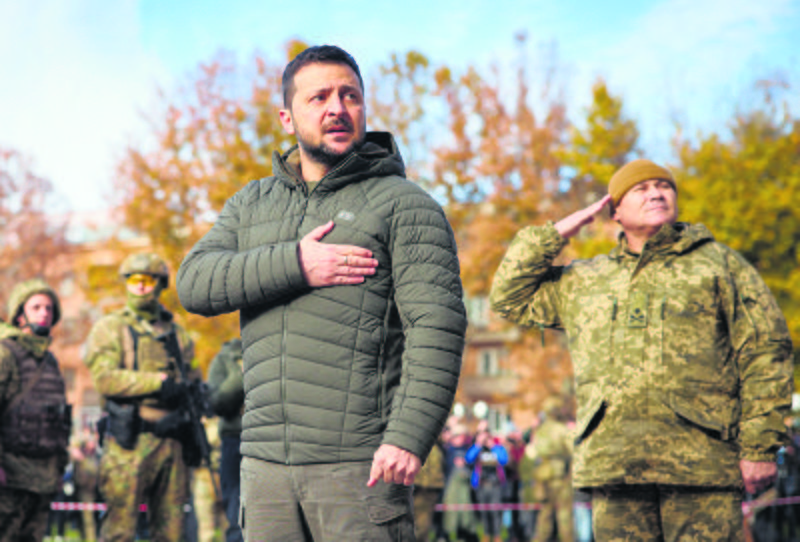Ceasefire may happen eventually, but the hostility is sure to endure

ntractable: The Ukraine war is a fratricidal conflict for Russia. ap
https://cdn.vuukle.com/widgets/audio.html?version=1.0.5
Advertisement

The Ukraine situation has become intractable. At its core, for Russia, and especially for President Vladimir Putin, it is a fratricidal conflict. His invasion of and war on Ukraine are products of his deep-seated conviction that the Ukrainian government’s geopolitical actions constitute a continuing betrayal of a historically embedded sacred commonality. On the other hand, Ukraine’s leadership and the majority of its people do not share Putin’s emotions of enduring bonds; other than the Russian-speaking Ukrainians in the eastern and southern parts of the country, the rest moved on, either in the past or more recently, to pursue new directions, to chart their destiny independent of Russia.
Western pressures will increase on India to formally take a position on the Russian invasion.
For Putin, the Ukrainian government, after the Maidan Revolution of 2014, not only turned its back on common bonds but also it actively helped Western machinations to undermine Russia’s security. It was guilty of an unacceptable double betrayal. While the Ukrainian government and its Western backers asserted the right of sovereignty, for Putin, not only a brother had broken fraternal bonds, he had joined hands with the enemy. This was intolerable particularly as the enemy had broken assurances given to the Soviet Union that its agreement to the unification of Germany and changes in central and eastern Europe would not jeopardise Russian security; that NATO would not be expanded eastwards. Of course there were no written agreements between NATO and the Soviet Union regarding NATO’s eastward expansion but there is material in the public domain that senior US officials gave verbal assurances to their Soviet counterparts on this issue.
Over the past two decades, NATO relentlessly expanded eastwards despite Russian warnings. Fourteen countries joined NATO between 1999 and 2020. The West led by the US disregarded Russian protests, giving rise to a feeling that it was only a question of time before Ukraine was taken into the EU fold and thereafter into NATO. Putin’s insecurity rose and certainly the Western leadership should have taken that into account but his invasion of Ukraine cannot be justified. Russia’s invasion and war are violations of the basic principles of the UN by a permanent member of the Security Council which is responsible for the maintenance of international peace and security.
The war has not gone to Putin’s plan. The Russian army was unable to deliver on his first objective of creating conditions for the fall of the Volodymyr Zelenskyy regime and the installation of a Russia friendly government. That would have been possible through a lightning move to capture Kyiv. But the Russian forces got bogged down in the initial weeks, giving time to Zelenskyy to rally his people and for the West to come to Ukraine’s aid with a massive supply of weaponry and for the overwhelming majority of UN member-states to condemn the Russian invasion.
The action came as a profound shock to the European conviction of its exceptionalism. It also shook the continent’s security architecture. Neither Europe nor NATO could accept that any state blatantly used force to change a European state’s territories and attempt regime change. Thwarted in his initial aims, Putin was left with no alternative but to abandon the idea of regime change and limit his war aims to the Russian-speaking areas of eastern and southern Ukraine. He upped the ante by amalgamating Donetsk, Luhansk, Kherson and Zaporizhzhia into Russia. It will now be very difficult for him or any Russian government to reverse this decision. Thus, the conflict has become intractable, for it is difficult to conceive that Ukraine or NATO will agree to these areas formally and legally becoming part of Russia. Therefore, the way out is through a search for creative diplomatic solutions which would begin with a ceasefire.
The chances for a ceasefire are low in the foreseeable future. The US and its allies are increasing economic and financial pressure on Russia through the application of sanctions and continuing military pressure through the supply of more sophisticated weaponry to Ukraine. They hope that these will bite the Russian people who will demand from Putin a change in his stance on Ukraine. This is improbable because of entrenched Russian nationalism. In these circumstances, the international community’s appeal to the warring parties to give diplomacy and dialogue an opportunity is unlikely to be heeded at an early date. Armed hostilities will drag on. If the US supplies weapons which will enable Ukraine to carry the fight into internationally recognised Russian territory, the situation will become very dangerous. Putin has warned that that can have incalculable repercussions — a reference to a possible nuclear dimension coming into play.
Since World War II, the US and Russia’s predecessor states suffered strategic defeats, the former in Vietnam and Afghanistan, and the latter in Afghanistan. However, the Ukraine situation is different, for it is fratricidal for Russia. A ceasefire may happen, but the conflict will endure. However, there is no early prospect of a ceasefire. Meanwhile, the international community has come to terms with the immense difficulties in food and energy supplies caused by the war. In this process, the Global South has borne a disproportionate cost of the war.
Indian diplomacy has, as yet, managed the difficult situation arising out of the conflict well. However, there is little doubt that Western pressures will increase on India to formally take a position on the Russian invasion, even though India has stressed the paths of diplomacy to Russia and PM Modi has publicly spoken against the resort to war in Putin’s presence. With India currently having G20’s rotational presidency, the West will expect Modi to play a more active diplomatic role to find a solution, at least for a ceasefire. The conditions, though, are not conducive for Modi to play such a role, for the parties concerned remain rigid.
